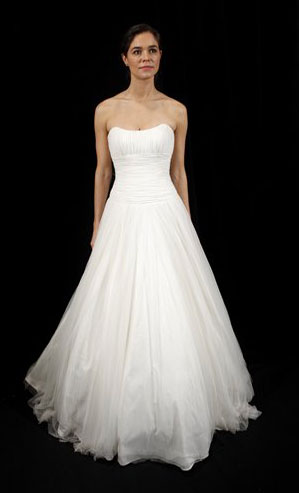Many brides positively know what their wedding gown will look like long before they meet their groom, and they’re not going to let a little thing — OK, actually a huge thing — known as the economy dash their dream dress.
They are seeking out gowns with smaller price-tags, according to industry experts, but their expectations haven’t shrunk accordingly.
What’s a gown designer to do?
Give these women what they want and bundle it up in a big white bow. There’s really no arguing with a bride who has made up her mind.
At the most recent round of wedding fashion previews, observers said there were a lot of sellable gowns catering to a variety of tastes and lifestyles, none of which, however, were obviously pared-down. There might have been a little less beading and fewer exotic trims, such as feathers, to keep costs down, but there wasn’t an industry-wide movement toward gowns on the cheap, the insiders said.
“When I try to think of one overriding theme, it’s that brides still want the options for the wedding they want to have,” said Darcy Miller, editorial director of Martha Stewart Weddings. And of course, she added, each bride wants a different kind of wedding; it’s a traditional, formal blowout for one, a more casual beach bash for another.
“Because of the economic climate, a lot of brides are willing to get a DJ instead of a band, do it on Sunday instead of a Saturday night, but they still have the wedding and still have the dream of what they wanted their dress to be,” Miller said.
Designer Monique Lhuillier said she feels almost protective when crafting wedding gowns, which is different than the trendsetter role she might play when working on red-carpet gowns or ready-to-wear clothes.
“It’s a wedding, a celebration, a new life, a new love, a new chapter. I’m honored to be a part of it and rework the dress to make sure it’s perfect in my own eye,” said Lhuillier.
“I thought about the ultimate bride and how much we could give her,” said another designer, Reem Acra. “The perfect look is that she wants to stay young, stay fresh and be able to travel with the dress.”
Acra captured modern and airy silhouettes influenced by a trip to Japan, where she was impressed with gardens, Zen and an aesthetic of purity.
There’s no “flash” in the gowns, Acra explained, since she was aiming for a sweeter sort of beauty, when a bride gets caught up in the romance of the occasion.
“You want the bride to feel like she’s getting married — that it’s pure and real,” she said. “After all, you’re not getting married to throw a party or even to wear the dress. You are getting married to get married — for you, for him, for the both of you — and these dresses are supposed to reflect that.”
Trends are barely a blip on Nicole Miller’s radar as she does her bridal collection, nevermind that she also designs fashion-forward cocktail frocks.
A good, flattering gown that can be worn by different ages and body types is another story, though. “If I have a really good-selling evening gown, I’ll do a version for bridal because I already know the silhouette is selling. I might add beading or longer train,” she said.
Her favorite from her new collection is a crushed metal-taffeta dress with a pleated bottom and tucks up the front.
What brides want most is to look fantastic, and what they think about is how gowns flatter their figure and appear in photographs, Nicole Miller said. That’s why corsets sell so well in bridal, she added with a laugh.
Michael Shettel, designer of the Alfred Angelo collection, said sleek and slim is one popular direction for brides; the other, at the opposite end of the spectrum, is the modern ballgown.
“We approached this season with the inspiration of jazz on a summer’s day,” said Shettel, who watched a 1958 documentary about the Newport Jazz Festival as part of his process. “What was striking was how modern the casual sort of dresses looked in 1958 with the juxtaposition of the jazz-world glamour.”
The way to find the perfect dress, he said, is to try it on and see how it moves, because movement brings the dress alive.



